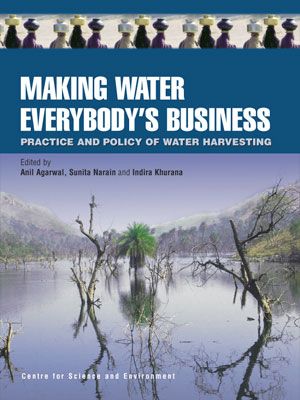WORK OVERVIEW
CSE has been working on rural water and sanitation issues for over two decades, with its focus on the need for sustainable management of water and wastewater. As part of this work, we have spearheaded research projects, documented case studies, produced a wide range of publications, reports and manuals, and undertaken model projects and training programmes. This work has resulted in some of CSE’s most influential and widely appreciated publications, among them Dying Wisdom: The Rise, Fall and Potential of Traditional Water Harvesting Systems, a monumental study that catalysed political leaders, judiciary, the media and other decision-makers into start thinking about rainwater harvesting, and Making Water Everybody’s Business, a treatise on the theory and practice of rainwater harvesting targeted at planners and policy-makers. In 1998, CSE was invited by the then President of India, K R Narayanan, to set up a rainwater harvesting structure at the Rashtrapati Bhawan.
In the past, CSE has taken the rainwater harvesting campaign to rural areas by creating a network of communities called jal biradari (water communities). It has conducted lectures, demonstrations, exhibitions and workshops; organised a series of unique eco-tours of harvesting structures in rural regions, called paani yatras; established Rain Centres in some cities (Chennai, Meerut); and helped schools, residential colonies, households and industries harvest rainwater.
CSE’s Rural Water and Sanitation programme works today with its sights on three key thematic areas:
Equitable access to clean water and sanitation for all: To ensure this, the programme initiative focuses on alternative paradigms of water supply and sanitation, such as rainwater harvesting, decentralised water supply, etc. The effort is to develop strategies for building technical capacity to implement projects on these alternative paradigms.
Alternative wastewater management technologies for pollution control: Designed to find ways to combat the problem of pollution and resultant health burden on the poor, this initiative acknowledges the inter-linkages between water and sanitation strategies. It focuses on research and evidence-based advocacy on decentralised wastewater management technologies to make them affordable and sustainable.
Policy guidelines for moving towards sustainable rural sanitation: This involves researching and reporting on, and documentation of, best practices on rural sanitation, so that water and waste management strategies work for livelihood and health.
The goal of the programme is to establish policy principles, innovative technologies and implementation strategies for water and wastewater management – to help lay the foundations of a water- and waste-prudent society. The programme, therefore, is geared to help re-invent the rural water-wastewater management systems. Interventions are designed to help build institutional and technical capacities of key agencies and practitioners; install demonstration projects on alternative technologies that serve as useful models of good practices; and leverage policy and implementation opportunities by working closely with water and sanitation agencies.
The programme has now expanded beyond the boundaries of India to some other nations of the Global South, with the objective of engendering south-south cooperation to exchange information and build capacity in the area of safe sanitation practices, including safe management, treatment and reuse of excreta.







Share this article